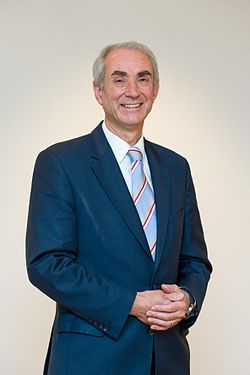Gerd Leers
| Gerd Leers | |
|---|---|
 |
|
| Minister for Immigration, Integration and Asylum Affairs | |
|
In office October 14, 2010 – November 5, 2012 |
|
| Prime Minister | Mark Rutte |
| Preceded by | Rita Verdonk (as Minister for Integration and Immigration) |
| Succeeded by | office abolished (for the parliament of 2012-2017) |
| Mayor of Maastricht | |
|
In office February 1, 2002 – March 1, 2010 |
|
| Preceded by | Philip Houben |
| Succeeded by | Jan Mans |
| Member of the House of Representatives | |
|
In office September 4, 1990 – February 1, 2002 |
|
| Personal details | |
| Born |
Gerardus Bernardus Maria Leers July 12, 1951 Kerkrade, Netherlands |
| Nationality | Dutch |
| Political party |
Labour Party (1975-1976) Christian Democratic Appeal (since 1976) |
| Residence | Maastricht, Netherlands |
| Alma mater |
Radboud University Nijmegen (M.A.) University of Central Missouri (Dr.h.c.) |
| Occupation |
Politician Civil servant |
| Religion | Roman Catholic |
Gerardus Bernardus Maria "Gerd" Leers (born July 12, 1951) is a former Dutch politician of the Christian Democratic Appeal (CDA). He was the Minister for Immigration, Integration and Asylum Affairs in the first Rutte cabinet from October 14, 2010 to November 5, 2012. He was a member of the House of Representatives of the Netherlands between September 1990 and February 2002. He became mayor of Maastricht in 2002, but he resigned following an affair concerning a holiday villa project in Byala, Varna Province in Bulgaria.
On September 4, 1990 Leers became a Member of the House of Representatives. He was a member of the permanent parliamentary commission for transport and water management. The political peak in his House of Representatives period was the Betuwe route, of which Leers was a strong proponent. However, he was also involved in a construction fraud scandal.
Leers became Mayor of Maastricht on February 1, 2002 after Karl Dittrich withdrew his candidacy. In 2008, he stood for mayor of The Hague and of Rotterdam. As mayor Leers took strict measures, such as the raid on the travellers camp Vinkenslag and stopping the subsidy to the football club MVV. He also was against amnesty for failed asylum seekers. In late 2004 Leers was chosen as best mayor of the Netherlands. This choice came after a conflict with the civil service, after heavy criticism from Leers.
Leers also gained attention for his attitude with respect to the policy on soft drugs. He criticised the tolerance policy that permits consumption and sale of marihuana and hashish, but prohibits its growing. Leers argued for legal production under government supervision, which would supposedly improve quality and therefore the public health . Leers also proposed the construction of a "weed boulevard" on the south side of Maastricht, so that drugs tourists would no longer cause trouble in the city centre. However, this proposal was rejected.
...
Wikipedia
